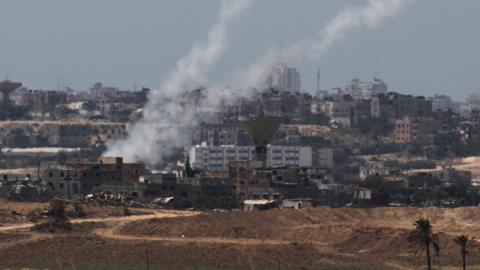Recently, President Obama urged an international conference in Cairo to rebuild yet again the terrorist-led mini-state in Gaza. We should remove its chosen weapons of terror first.
The last time we rebuilt Gaza, Hamas hid behind fresh concrete and human shields to rain rockets on Israeli civilians — leaving Israel no choice but to destroy what had been re-built.
As Secretary of State John Kerry admitted at the Cairo conference, “This is the third time in less than six years that, together with the people of Gaza, we have been forced to confront a reconstruction effort.”
How do we avoid a predictable fourth round? Kerry said, “We’ve got to find a way to get back to the [peace negotiations] table and help people make tough choices, real choices.” But he then admitted that we’re nowhere near that point.
In the real world, putting an end to the need to rebuild Gaza requires addressing its more immediate cause.
Buildings and infrastructure in Gaza weren’t damaged because Israelis and Palestinians can’t agree on final peace. West Bank buildings stand undisturbed.
Gaza was damaged because the terrorist organization that runs it fired thousands of rockets from behind human shields in urban areas of Gaza.
This violates the rules of war. Had Hamas not attacked from urban areas, urban areas wouldn’t have been destroyed.
Donors are weary, because they know Hamas will just do it again. And why not, so long as the international community relieves Hamas and the Palestinians of the long-term consequences of Hamas’ misdeeds? Indeed, its war has brought promises of $5 billion in new aid.
Herein lies the international community’s dilemma: Terrorists count on it to endlessly rebuild Gaza. Good countries bail out the perpetrators of terrorism and those who actively support them or passively endure them, ultimately bringing more pain to the innocent.
As Kerry said, “As long as there is a possibility that Hamas could fire rockets on Israeli civilians at any time, the people of Gaza will remain at risk.”
So, this third time around, aid must come with conditions that discourage a fourth round and impose costs if Hamas sets upon this course once again.
The Palestinians must declare and turn in rockets currently in Gaza, and commit that they will not smuggle more into the region. To verify and enforce this, they must agree not only to extensive border checks, but to no-notice inspections and subsequent re-inspections of Gaza itself.
These should be carried out by Egyptian and other international forces and monitors, under the protection of Egyptian troops if necessary, before aid is dispersed.
Some rockets may escape the net. But it’s unlikely that thousands would evade vigorous, good-faith inspections.
Ultimately, if Hamas retains rockets and power in Gaza, there will be war and suffering in Gaza again. The solution would then reside in a change of the governing structure.
If moderate Palestinians don’t step up, Egypt would be a natural partner to step in to help lead a way back to peaceful self-governance. In time, stability free of terrorist aggression and terrorist leadership is the only route to Gazans living decent lives.
Back in 2009, the Obama administration put the Israeli-Palestinian dispute at the center of the region’s problems.
However, despite some backsliding now and then, the Obama administration of 2014 seems to have learned better. ISIS has left its mark.
President Obama told the United Nations recently, “The situation in Iraq, Syria and Libya should cure anyone of the illusion that [the] conflict [between Palestinians and Israelis] is the main source of problems in the region; for far too long it has been used in part as a way to distract people from problems at home.”
Instead, the president decried the gravest danger: the “cancer of violent extremism.”
Subsidizing Gaza while it bristles with rockets spreads the cancer: Iran’s Hamas proxies will rain terror and provoke crises at times of the ayatollahs’ choosing.
The West can be both practical and morally clear in Gaza. Winking at terrorist arsenals in Gaza will ultimately frustrate international donors, lead to higher costs, delay peace, empower Iran and destroy more innocent lives.


















